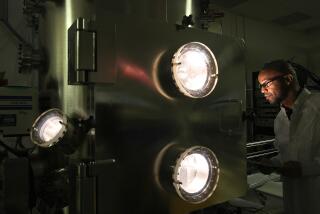UTC Aerospace to end aircraft systems manufacturing in Chula Vista, cutting 300 jobs
UTC Aerospace Systems plans to wind down manufacturing at its Chula Vista aircraft plant beginning early next year, eliminating around 300 jobs.
The company — a division of Farmington, Conn.-based conglomerate United Technologies Corp. — said the decision stems from ending production of certain commercial aircraft models. The Chula Vista plant builds aerodynamic engine pods and mounts for customers such as Boeing and Airbus.
UTC Aerospace plans to keep aftermarket spare parts distribution, engineering test labs and administrative support jobs in Chula Vista.
“We remain committed to being in Chula Vista,” said Stacey MacNeil, vice president of communications for UTC Aerospace. “There will still be 1,500 jobs there. We are not shutting down the entire location.”
The closure of manufacturing, however, will end production of aircraft components at the plant, which has been building planes and supplying aircraft subsystems since Fred Rohr founded Rohr Aircraft Co. in 1940.
“We recognize the impact this decision will have on our employees and their families, and will not begin the wind-down until 2019,” the company said in a statement. “We expect the entire process to take place over a two-year period.”
The layoffs include about 265 sheet-metal workers who are members of the International Assn. of Machinists and Aerospace Workers. Nonunion supervisors, purchasers and other salaried workers involved in manufacturing also will lose their jobs.
In July, UTC Aerospace Systems notified the union of the planned shutdown. The union contends that the company has systematically channeled work on active aircraft programs to other, lower-cost factories.
“Work that could be done in Chula Vista has been sent to Mexicali; Foley, Alabama; and up to Washington,” said J.P. Fletcher, area director for District 725 of the International Assn. of Machinists and Aerospace Workers. “You just see UTC outsourcing and outsourcing. A lot of the components that are now being done in Mexicali are shipped back to Chula Vista and then distributed to wherever in the country.”
Robert Martinez Jr., president of the union, sent a letter to President Trump in September objecting to the closure.
“At one time, this facility employed several thousand workers who were involved in state of the art programs,” Martinez wrote. “A few years ago, many of them lost their jobs when their work was moved to Mexico. At the same time that aerospace work has been decimated in Chula Vista, aerospace work continues to grow in Mexico.”
MacNeil denied that work had been moved elsewhere and attributed the shutdown to shrinking production of older-generation commercial aircraft.
United Technologies has come under criticism for job cuts with other companies it owns. In 2016, while Trump was on the campaign trail, it announced plans to move its Carrier heating and air-conditioning plant from Indianapolis to Mexico. The expected loss of more than 2,000 jobs became a hot-button topic when Trump sharply criticized United Technologies.
Trump and Vice President Mike Pence, former governor of Indiana, reached a deal with Carrier to keep about half of the jobs at the plant in return for up to $7 million in tax incentives and training grants. United Technologies said last year that about 1,100 people would remain at the Indianapolis facility, while roughly 600 jobs would be relocated, according to news reports.
Over the years, the Chula Vista UTC plant has built components for several high-profile aircraft programs. They include the engine pods, or nacelles, for World War II-era B-24 long-range bombers and portions of the F-14 Tomcat starting in the 1970s. It also designed solid rocket motor casings, seals and nozzles for the space shuttle program that launched in 1981.
More recently, the company built engine pods for Boeing’s 787 and Airbus’ A350 commercial aircraft.
Goodrich Corp. bought Rohr Aircraft Co. in 1997, and then United Technologies acquired Goodrich in 2012.
The first round of layoffs is expected in the first quarter of next year, with a second round slated late in the year. The final round of layoffs would occur in the fall of 2020.
mike.freeman@sduniontribune.com
Freeman writes for the San Diego Union-Tribune.






